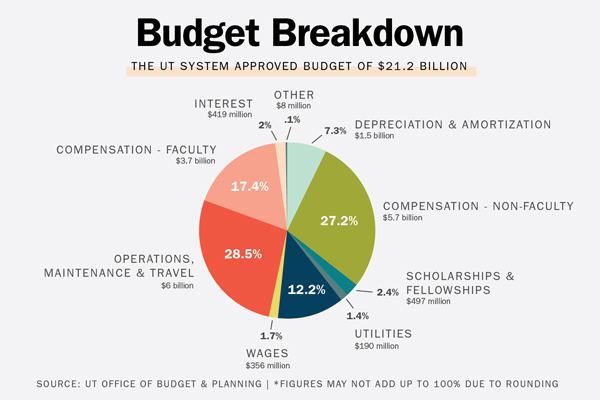The UT System budget has increased nearly 7.4% since the last fiscal year due to an increase in projected budgeted revenue, according to the recently approved budget report.
The UT System Board of Regents authorized a $21.1 billion systemwide expense budget for the 2020 fiscal year during their Aug. 15 board meeting. The budget includes $6.7 billion for UT System academic institutions and $14 billion for UT System’s health institutions.
“(The budget increase) is huge,” said Nick Long, assistant vice chancellor for the UT System Office of Budget and Planning. “It far exceeds what you’re going to see from most public universities and most public university systems in the country.”
Long said most of the expected funds will come from the six health institutions, which will have a predicted increase of more than $1 billion in revenue.
According to the report, the academic institutions had an increase of about $400 million in revenue, and one of the major drivers of this is the $80 million from net tuition and fees. Net tuition and fee revenue from the health and academic institutions is expected to increase from the previous fiscal year, according to the report.
Karen Adler, director of media relations at the UT System, said the bulk of the net tuition and fee revenue came from student enrollment.
The projected revenue with the projected expenses together leaves about $600 million in profit, according to the report’s numbers.
“We’re not looking to make some huge profit, but we obviously want to make sure we have little more than covering our costs … That’s when we see growth and revenue,” Long said.
According to the report, UT-Austin also received about $424 million from the Available University Fund, which is comprised of a percentage of the return of UT System investments. The money will go to faculty retention, academic infrastructure, student programs and services, research competitiveness, outreach, graduate student support and accountability efforts.
While the amount per year may vary, Long said UT-Austin is required to receive at least 53% of the fund. He said UT-Austin received a rate of 56.5% this year, but the percentage may change during the next fiscal year.
Long said all of the institutions were looking to increase their research expenditures in this budget. UT-Austin is expecting a 9.2% increase in research expenditures, according to the report.
“A lot of our campuses are looking to grow their research base,” Long said. “That goes without saying. While research is not inherently a money-making business, it’s a sign of prestigious academia.”
System Chancellor James Milliken said the UT System is aiming to invest more in education, research and health care in the systemwide budget, according to the press release.
“Our institutions must offer high quality educational opportunities to a rapidly growing population, train the next generation of health care professionals, provide the best patient care and expand research that drives innovation and economic growth,” Milliken said in the press release.





















